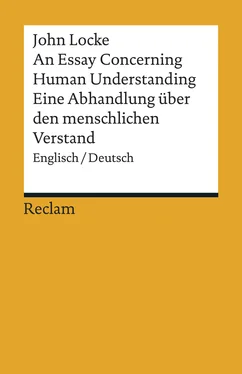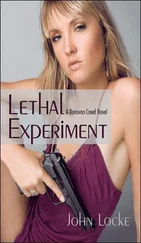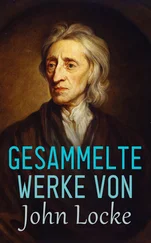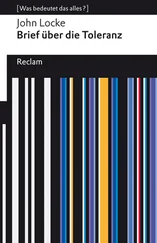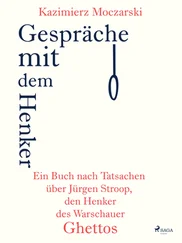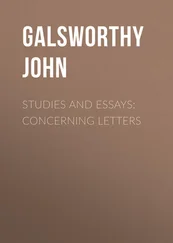§ 8. Nor are we to wonder, that Powers make a great part of our complex Ideas of Substances ; since their secondary Qualities are those, which in most of them serve principally to distinguish Substances one from another, and commonly make a considerable part of the complex Idea of the several sorts of them. For our Senses failing us, in the discovery of the Bulk, Texture, and Figure of the minute parts of Bodies, on which their real Constitutions and Differences depend, we are fain to make use of their secondary Qualities, as the characteristical Notes and Marks, whereby to frame Ideas of them in our Minds, and distinguish them one from another. All which secondary Qualities, as has been shewn, are nothing but bare Powers. […]
[…]
§ 11. Had we Senses acute enough to discern the minute particles of Bodies, and the real Constitution on which their sensible Qualities depend, I doubt not but they would produce quite different Ideas in us; and that which is now the yellow Colour of Gold, would then disappear, and instead of it we should see an admirable Texture of parts of a certain Size and Figure. This Microscopes plainly discover to us: for what to our naked Eyes produces a certain Colour, is, by thus augmenting the acuteness of our Senses, discovered to be quite a different thing; and the thus altering, as it were, the proportion of the Bulk of the minute parts of a coloured Object to our usual Sight, produces different Ideas , from what it did before. […]
[292]§ 12. The infinite wise Contriver of us, and all things about us, hath fitted our Senses, Faculties, and Organs, to the conveniences of Life, and the Business we have to do here. We are able, by our Senses, to know, and distinguish things; and to examine them so far, as to apply them to our Uses, and several ways to accommodate the Exigencies of this Life. […] But it appears not, that God intended, we should have a perfect, clear, and adequate Knowledge of them: that perhaps is not in the Comprehension of any finite Being. We are furnished with Faculties (dull and weak as they are) to discover enough in the Creatures, to lead us to the Knowledge of the Creator, and the Knowledge of our Duty […].
[…]
§ 15. […] putting together the Ideas of Thinking and Willing, or the Power of moving or quieting corporeal Motion, joined to Substance, of which we have no distinct Idea , we have the Idea of an immaterial Spirit; and by putting together the Ideas of coherent solid parts, and a power of being moved, joined with Substance, of which likewise we have no positive Idea , we have the Idea of Matter. The one is as clear and distinct an Idea , as the other: The Idea of Thinking, and moving a Body, being as clear and distinct Ideas , as the Ideas of Extension, Solidity, and being moved. For our Idea of Substance, is equally obscure, or none at all, in both; it is but a supposed, I know not what, to support those Ideas , we call Accidents. It is for want of reflection, that we are apt to think, that our Senses shew us [294]nothing but material things. Every act of sensation, when duly considered, gives us an equal view of both parts of nature, the Corporeal and Spiritual. For whilst I know, by seeing or hearing, etc . that there is some Corporeal Being without me, the Object of that sensation, I do more certainly know, that there is some Spiritual Being within me, that sees and hears. This I must be convinced cannot be the action of bare insensible matter; nor ever could be without an immaterial thinking Being.
[…]
§ 17. The primary Ideas we have peculiar to Body , as contradistinguished to Spirit, are the cohesion of solid , and consequently separable parts , and a power of communicating Motion by impulse . These, I think, are the original Ideas proper and peculiar to Body; for Figure is but the consequence of finite Extension.
§ 18. The Ideas we have belonging, and peculiar to Spirit, are Thinking , and Will , or a power of putting Body into motion by Thought, and, which is consequent to it, Liberty. For as Body cannot but communicate its Motion by impulse, to another Body, which it meets with at rest; so the Mind can put Bodies into Motion, or forbear to do so, as it pleases. The Ideas of Existence, Duration, and Mobility, are common to them both.
§ 19. There is no reason why it should be thought strange, that I make Mobility belong to Spirit : For having no other Idea of Motion, but change of distance, with other Beings, that are considered as at rest; and finding that Spirits, as well as Bodies, cannot operate, but where they are; and that Spirits do operate [296]at several times in several places, I cannot but attribute change of place to all finite Spirits […].
§ 20. […] No Body can imagine, that his Soul can think, or move a Body at Oxford , whilst he is at London ; and cannot but know, that being united to his Body, it constantly changes place all the whole Journey, between Oxford and London , as the Coach, or Horse does, that carries him; and, I think, may be said to be truly all that while in motion: Or if that will not be allowed to afford us a clear Idea enough of its motion, its being separated from the Body in death, I think, will: For to consider it as going out of the Body, or leaving it, and yet to have no Idea of its motion, seems to me impossible.
[…]
§ 22. Let us compare then our complex Idea of an immaterial Spirit, with our complex Idea of Body, and see whether there be any more obscurity in one, than in the other, and in which most. […] I know that People, whose Thoughts are immersed in Matter, and have so subjected their Minds to their Senses, that they seldom reflect on any thing beyond them, are apt to say, they cannot comprehend a thinking thing, which, perhaps is true: But I affirm, when they consider it well, they can no more comprehend an extended thing.
§ 23. If any one says, he knows not what ’tis thinks in him; he means he knows not what the substance is of that thinking thing: No more, say I, knows he what the substance is of that [298]solid thing. Farther, if he says he knows not how he thinks; I answer, Neither knows he how he is extended; how the solid parts of Body are united, or cohere together to make Extension. […]
[…]
§ 28. Another Idea we have of Body, is the power of communication of Motion by impulse; and of our Souls, the power of exciting of Motion by Thought . These Ideas , the one of Body, the other of our Minds, every days experience clearly furnishes us with: But if here again we enquire how this is done, we are equally in the dark . For in the communication of Motion by impulse, wherein as much Motion is lost to one Body, as is got to the other, which is the ordinariest case, we can have no other conception, but of the passing of Motion out of one Body into another; which, I think, is as obscure and unconceivable, as how our Minds move or stop our Bodies by Thought; which we every moment find they do. […] And if we consider the active power of Moving, or, as I may call it, Motivity , it is much clearer in Spirit than Body; […] and therefore it is worth our consideration, whether active power be not the proper attribute of Spirits, and passive power of Matter. Hence may be conjectured, that created Spirits are not totally separate from Matter, because they are both active and passive. Pure Spirit, viz . God, is only active; pure Matter is only passive; those Beings that are both active and passive, we may judge to partake of [300]both. But be that as it will, I think, we have as many, and as clear Ideas belonging to Spirit, as we have belonging to Body, the Substance of each being equally unknown to us […].
Читать дальше
